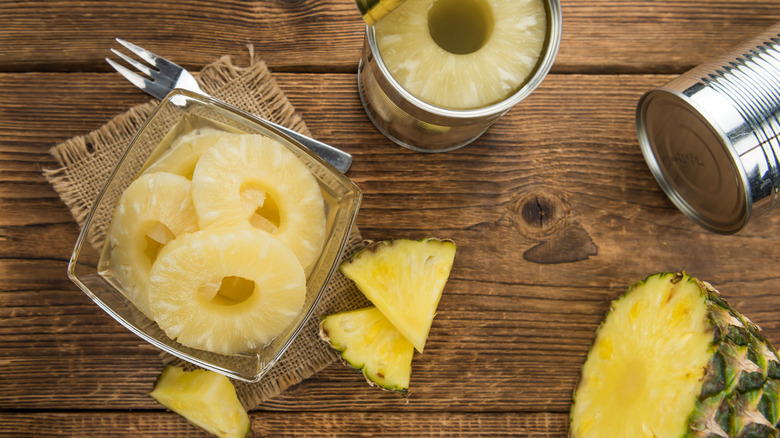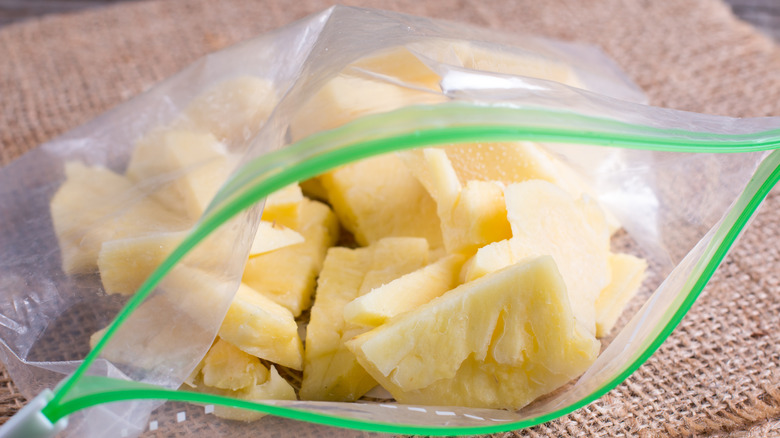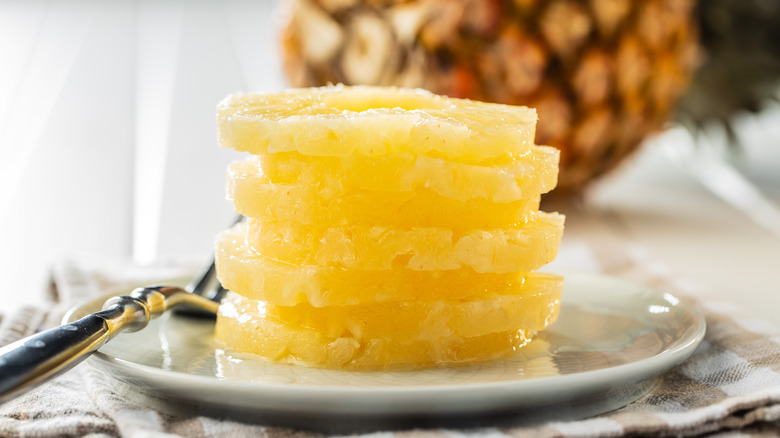Is It OK To Freeze Canned Pineapple?
From enhancing fruit smoothies and salads to topping off pizza and pork tacos, pineapple is a tasty and versatile fruit that works in multiple sweet and savory dishes. The problem with cooking with this spiky fruit is that fresh pineapple can be irritating to peel, cut, and core — the rind is thick and difficult to slice, not to mention prickly and hard to hold. For this reason, some people turn to canned pineapple when cooking tropical dishes and blending fruity drinks. Eating canned pineapple is also one secret to avoiding pineapple mouth-burn.
After opening a can of pineapple, you might wonder whether you can store the leftovers and how long they'll stay fresh. The good news is, just like fresh pineapple, canned pineapple can be frozen for future use. There's no need to waste your leftovers — it's super convenient to have pineapple on hand in your freezer for making tropical smoothies or to garnish the ultimate piña colada recipe. Also, did you know that canned pineapple is your best bet for making upside-down cake? Per the USDA, opened canned pineapple can last in the refrigerator for around 5 to 7 days, though you can greatly extend its shelf-life by freezing it — canned fruit can generally retain its taste for several months if stored properly in the freezer.
How to properly store canned pineapple
If you have leftovers from your open can of pineapple and you don't plan to use them in the next 5 to 7 days, consider freezing them instead of throwing them out. However, don't just put some plastic wrap over the top of the can and stick it in your freezer — the juices in the can will freeze and expand, potentially causing the can to crack and burst, spilling sticky juice all over your other frozen goods. In addition to cracking the can, whether put in the fridge or the freezer, leaving any leftovers in the can is not recommended, since it's not the ideal method for preserving the flavor of your pineapple.
Instead, when you're ready to freeze your canned pineapple, drain the juice and soak up any remaining moisture. Then, transfer the fruit to an air-tight, freezer-safe container or storage bag. Removing as much air as possible from the bag or container will also help keep it fresher for longer. When you're ready to use the pineapple, you have a few options for thawing depending on how soon you need it: You can transfer it to a microwave-safe dish and microwave on the defrost setting, or submerge it in cold water, leaving it in the bag or container. You can also prep the day before your intended use by transferring the bag or container to the fridge until it softens, which usually takes around 10 to 12 hours.
Canned vs. fresh pineapple
Canned and fresh pineapple can be stored similarly — up to a week in the refrigerator and at least 6 months in the freezer in an air-tight container or bag. As far as flavor goes, fresh pineapple has a more tart, pronounced taste than canned pineapple, which tends to be sweeter due to the sugar added in the canning process. Canned pineapple, like any canned food, can sometimes have a metallic taste, but soaking it in cold water for 30 minutes or so may help remove any lingering metal flavor.
Because of the added sugar, sweetened syrup, and the heating process it undergoes when cooking, canned pineapple is often viewed as less nutritious than the fresh version. Though some of the nutrients are cooked off, canned pineapple is nutritionally similar to fresh pineapple, especially if you choose the no-sugar-added version. Pineapple, both fresh and canned, is rich in nutrients like vitamin C, which supports your immune system, and manganese, which promotes bone health (per Everyday Health).
Fresh pineapple contains an enzyme called bromelain, which has anti-inflammatory properties, promotes healing, and can aid digestion, according to Everyday Health. Bromelain is also speculated to be the reason why eating fresh pineapple can cause your mouth to burn or tingle. This enzyme is removed during the heating process in canning, which means you won't feel the burn when eating canned pineapple, but you'll also be missing out on the nutritional qualities of bromelain. This enzyme also dissolves gelatin, and therefore, canned pineapple is the best choice when making recipes that use gelatin, like a tasty Amish yum yum salad.


